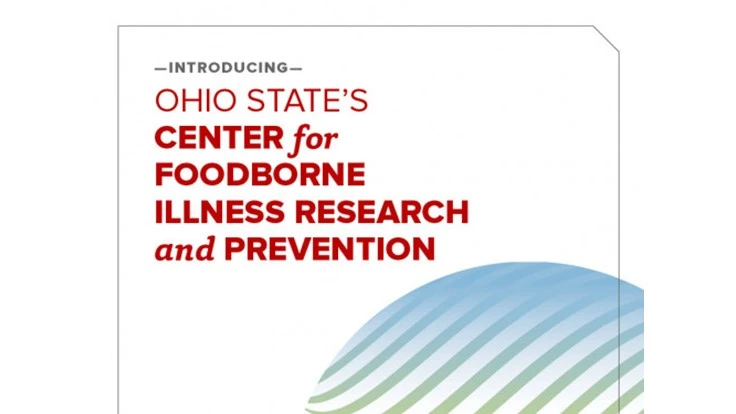
At The Ohio State University in Columbus, Ohio, a new food safety center will provide a centralized location for food safety resources and will further establish the university as a global leader in food safety.
The Center for Foodborne Illness Research and Prevention (CFI) is bringing its 13-year record of protecting public health to Ohio State’s College of Food, Agricultural, and Environmental Sciences (CFAES).
Founded as a nonprofit organization in December 2006, CFI’s mission is to advance a more scientific, risk-based food safety system that prevents foodborne illnesses and protects public health by translating science into policy and practice, said Barbara Kowalcyk, a CFAES assistant professor of food science and technology and an internationally recognized food safety expert.
“Access to affordable, safe, and nutritious food is increasingly critical in order to sustain the world’s growing population,” said Kowalcyk, who co-founded CFI and is the center’s director. “The establishment of CFI at Ohio State will build on the university’s extensive, existing efforts to address this critical challenge.”
This is significant, considering the World Health Organization estimates that 600 million illnesses and 420,000 deaths are caused annually by 31 foodborne hazards worldwide. In the United States, serious foodborne bacteria, viruses, and fungi cause an estimated 48 million illnesses, 128,000 hospitalizations, and 3,000 deaths each year, conservatively causing $77.7 billion in medical costs and lost productivity.
Among its many contributions, the center collaborated with other groups to develop, pass, and implement the Food Safety Modernization Act of 2010 (FSMA), which was the first major overhaul of food safety oversight at the U.S. Food and Drug Administration in more than 70 years. FSMA shifts the focus from responding to foodborne illnesses to preventing them.
The center also joined multiple efforts to strengthen government resources for national and state food safety programs, and it led an effort to require mandatory labeling of mechanically tenderized beef products, which have been associated with foodborne illnesses, Kowalcyk said.
The center will be housed within the CFAES Department of Food Science and Technology (FST).
CFI will provide a centralized location for food safety resources, researchers, faculty, and staff from several Ohio State colleges and departments including the College of Public Health, the John Glenn College of Public Affairs, the College of Veterinary Medicine, and the College of Education and Human Ecology. It also will work with industry partners, consumer food safety groups, other academic institutions, and government agencies charged with ensuring food safety,
Kowalcyk co-founded CFI with her mother, Patricia Buck, a food safety advocate and educator, to focus on promoting science-based approaches to preventing foodborne illnesses. The center was created to facilitate, encourage, and promote research on food safety; translate and communicate science and its implications for food safety to stakeholders; and work on behalf of consumers to implement a stronger, more science-based food system that prevents foodborne diseases.
CFI will hold its inaugural event, “Translating science into policy and practice: What are the food safety priorities?” on Nov. 14 and has established an endowment fund to help sustain the center’s work long-term. To learn more about CFI and the endowment fund, visit foodsafety.osu.edu.
Latest from Quality Assurance & Food Safety
- WHO, Nanyang Technological University Singapore to Host Food Safety Risk Assessment Workshop
- New CDC Report Says Bird Flu Spread Undetected in Veterinarians
- TAG Opens Registration for Preventive Controls for Human Food Qualified Individual Version 2 Training Courses
- Ohio Reports First Human Case of Bird Flu
- FSIS Issues Public Health Alert for Meat and Poultry Pasties Due to Misbranding, Undeclared Allergen
- Tri-Union Seafoods Recalls Tuna Cans Due to Botulism Risk
- Ellen MacArthur Foundation Big Food Redesign Challenge Inspires New Nature-Minded Food and Drink Products
- IFT to Host Webinar Exploring Latest Scientific Research Around Ultra-Processed Foods





